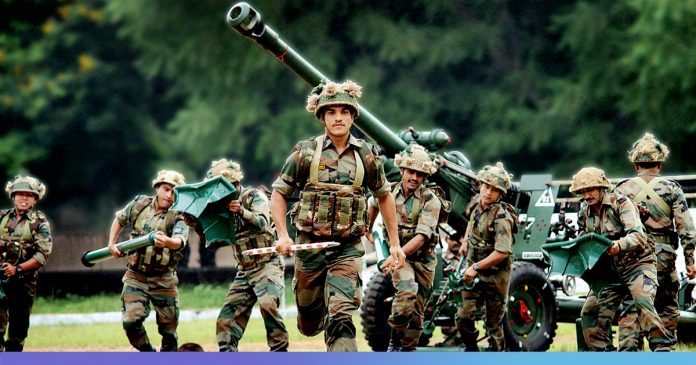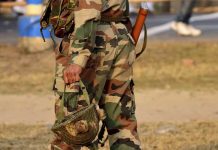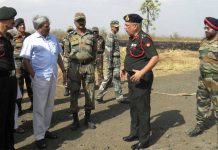This article is written by Dhruv Dubey, from Jagran Lakecity University Bhopal. This article talks about the various laws there for defence and their loopholes.
Table of Contents
Introduction
Military laws are the laws that govern the Army, Navy, and Airforce. These military laws give soldiers some special powers and also bind their behaviour. Under military law certain rights of the soldiers have been restricted and also some special rights have been given to them. For instance, the Indian Constitution says that those people, who are chosen for performing national duty, like soldiers or people working under bureaus, can not move to High Court or Supreme Court if their fundamental rights get restricted under some special acts like military laws.
These laws also help in maintaining proper discipline in the army and ensure proper working of the Army.
Military laws in India : an overview
India has its laws for governing its Army. These laws apply to the men and women working in an Indian force, which are as follows:
Navy Act
- Before India accomplished freedom, the Naval Forces were being represented by the Indian Navy (Discipline) Act, 1934, which was passed as per segment 66 of the Government of India Act, 1919.
- Later on, the act was replaced by the Naval Forces, brought up in India-the arrangements of the Naval Discipline Act 1866. Likewise, the U.K. The Maritime Discipline Act was adjusted and the Indian Navy Discipline Act, 1934 was authorized. Several constitutional changes were made. Because of this, it was felt important to change the enactment identifying with Naval Forces.
- Meanwhile, in 1950 the modified Army Act and Air Force Act were relaxed; it was unrealistic to modify the law managing the Naval Forces as the then existing Indian Navy (Discipline) Act, 1934 depended on the Corresponding British Act.
Army Act
India has various legislation for its military, and one most important legislation is the Army Act. This act was enacted in 1950, and it applies to soldiers who are enrolled under this Act and to the soldiers who belong to the Indian reserve force.
Air Force Act
The Air Force Act was commenced around the year 1950 and applies to soldiers who are enrolled under this Act and to the soldiers who belong to the Indian reserve force.
In India, certain Para-military forces have laws almost like people who apply to defence services. These include:
- The Border Private Security Power Act,
- The Coast Guard Act,
- The Border Police Act of Indo-Tibet
- The Assam Rifles Act.
Those Acts were replaced by the Military Act. The first intention with which the British created military value was to empower discipline in Indians after the Mutiny of 1857. This was the principal objective for the Indian Army Act 1950, the Navy Act of 1957 and the Air Force Act, 1950.
Defects in the Indian Military System
There are various defects present in our military system. Our military law sometimes reflects the ancient British justice system and therefore has some defects in it. To overcome these defects, it is very important to formulate a proper justice system.
No Bail provision
An arrested military official has no provision related to bail. The superior of military officials may grant the bail but it depends on their authority. The Supreme Court has given various standard principles upon which bail may be granted. However, providing bail depends on someone’s authority, which looks unreasonable.
Military laws don’t allow an offender to hire a civil lawyer to defend him or to be defended by an officer known as a defending official. This creates a shortage of legal aid services which is also a right under the Indian Constitution. (Article 21 of Indian Constitution).
Double jeopardy
Under the Indian constitution Article 20(2) enriches constitutional protection against prosecution. It is available under the military justice system but this defence is not available before a civil court to stop a second trial on the same offence.
Trial during a Summary Court-Martial
The trial of offender military workforce is held at the time when a Special Court is alluded to as the Summary Court Martial. The SCM trial doesn’t match with the measure of justice set by the Apex Court and the High courts, because there’s no prosecutor, and along these lines, the SCM plays out some of the elements of the prosecutor. Infringement of Article 22 of the Indian Constitution happens when the accused can’t defend himself with the help of a legal advisor or a protection official. SCMs are seriously criticized by the Supreme Court and high courts for failing inequitable and reasonable sensibility tests.
No right of appeal
There is no arrangement for the convicted to appeal to a higher court. The Military Act expresses that a person who sees himself as grieved by finding or sentence of a court-military may file a request with the central government, the head of the military, or any recommended superior official in charge of the one that confirmed the finding or sentence, and accordingly the central government, the head of the military or the other official may pass such requests because the case could likewise be (Section 164(2) of the Military Act).
Individuals from Court Martial-Members aren’t prepared or legally qualified to regulate justice. They’re under a different commanding influence and don’t practice their judgment independently during a trial.
Loopholes surrounding the enforcement mechanism
In a state composed of sovereign states, enforcement is traditionally decentralized, which accordingly gives a fundamental job to the state that has been or might be the victim of an infringement. The different states may decide to help the harmed state, as per their interest – which should incorporate the overall interest of each individual from that society to have its legal system respected.
This decentralized design of execution is especially improper for the International Humanitarian Law (IHL) pertinent to outfitted struggles, for the accompanying reasons.
To begin with, it would be truly astounding if questions emerging out of violation of the IHL were to be settled calmly, essentially in global armed conflicts. Surely, International Humanitarian Law applies between two states since they are engaged in armed conflicts, which demonstrates that they can’t resolve their disputes calmly.
Secondly, despite an armed conflict between two states, third states may have two responses. They can favour one side for reasons which are either simply political or then again, whenever related with international law, derive from Jus ad Bellum. They will, thus, help the survivor of the hostility, autonomously of who abuses the Jus in Bello. Other third states may decide not to favour one side. As neutrals they can assist with guaranteeing regard for International Humanitarian law, however, they will consistently take care to guarantee that their commitment for regard for International Humanitarian law won’t influence their essential decision not to favour one side.
Amendments implemented and scope for improvement
An enormous number of cases that are brought under the watchful eye of the upper civil courts show that the military’s justice delivery framework has been moving at a truly slow speed and has not been prepared to satisfy men’s aspirations in uniform. The larger number of legal cases tested by the Ministry of Defense and therefore the headquarters of the soldiers is quite a lot.
Many consider that the system of the military is against the Constitution’s liberal soul and there emerges an essential need to find some kind of harmony between a democratic society’s pressures and military discipline’s prerequisites. The military justice system of India can be traced back to England’s military laws. After the Mutiny of 1857, it had been made by the British to control natives and has some significant flaws. They are-
- No bail arrangements for the arrested military individual on charges.
- Insufficient legal help to the accused during the courts-military.
- The court-martial and chairman will be dependent upon considerable influence by the convening officer.
- The branch of Judge Advocate General will be put under the leader and functional control of an equivalent executive.
- No appeal is stopped against the finding and sentence of a court-military.
- The double hazard constitutional protection accommodated in Article 20 (2) of the Indian Constitution isn’t accessible to Air Force staff to stop a second trial under civil court.
Conclusion
The military law system oversees the job of the Indian Army during peace and war figured inside the kind of statutes, rules, and regulations. It’s a composing code that has seen periodic changes and reviews, aside from conventions of administration. Individuals of the soldiers have their own justice framework that is quite different from the common justice framework. The legal and justice system of the soldiers was intended to be moderately quick in execution to deal with trains and keep away from the long absence of military and military duties from officials. The system of appeals has subsequently not been incorporated inside the military justice framework, since it is inside the civil system.
As members of soldiers, nearly 1.5 million Indians are dependent upon the military justice framework. This group applies to a framework planned and carried out after the Mutiny of 1857 inside the name of discipline to serve the interests of colonial masters on Indians. In our country, the military justice framework is never criticized. Moreover, a veil of secrecy is drawn on military issues. There’s a straightforward pattern of progress inside the world’s military justice system as far as the privileges of the accused and human rights standards.
References
- .https://indiankanoon.org/doc/1154592/#:~:text=(1)%20Any%20person%20subject%20to,be%20considered%20necessary%20to%20satisfy
- .https://indianarmy.nic.in/writereaddata/documents/ARMYACTS190216.pdf
- .https://www.swlaw.edu/sites/default/files/2018-04/SWT104.pdf
- .https://casebook.icrc.org/law/implementation-mechanisms
LawSikho has created a telegram group for exchanging legal knowledge, referrals, and various opportunities. You can click on this link and join:
https://t.me/joinchat/J_0YrBa4IBSHdpuTfQO_sA
Follow us on Instagram and subscribe to our YouTube channel for more amazing legal content.
 Serato DJ Crack 2025Serato DJ PRO Crack
Serato DJ Crack 2025Serato DJ PRO Crack











 Allow notifications
Allow notifications


